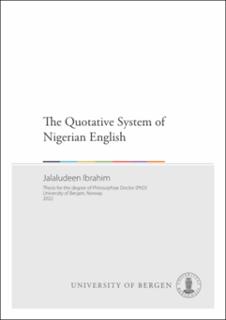| dc.description.abstract | This thesis explores the ways speakers of Nigerian English (NE) re-create their own speech and the speech of others in narrative discourse using different quotatives. Research on English quotatives largely concentrated on the spread of quotatives in native varieties (e.g. American English, Barbieri, 2007; British English, Buchstaller, 2006; Scottish English, Macaulay, 2001; New Zealand English, Buchstaller & D’Arcy, 2009; Australian English, Winter, 2002; Canadian English, Tagliamonte & D’Arcy, 2004), whereas non-native varieties have received notably less attention. Therefore, this thesis presents an account of the acquisition and spread of quotatives in NE, which is a non-native variety.
The study is based on naturally occurring data collected from 180 participants during sociolinguistic interviews conducted at different locations in Nigeria. The primary focus is on be like, say, tell, and zero quotatives on the grounds of their high frequency in my data. The study adopts Schneider’s (2007) Dynamic Model of Postcolonial Englishes to examine the emergence and development of NE, and Variationist Sociolinguistics (Labov, 1963, 1966; Trudgill, 1974; Tagliamonte, 2012) for the analysis of the quotatives. The analysis is based on a mixed-methods approach that relies on both quantitative and qualitative analyses.
The quantitative analysis was conducted using Rbrul (Johnson, 2009). The discourse analytic qualitative method was employed in the qualitative analysis mainly to address the question of how and why different quotatives have specific discourse-pragmatic functions in performed narratives. While investigating how users of NE differ from other varieties of English in their use of quotatives, the study explores how the speaker’s choice of the different quotatives is conditioned by both linguistic (the content of the quote, grammatical person of the quotative, and tense/time reference of the quotative) and social (age, sex, regional origin, and social class) factors.
The findings from this thesis show that there is a change in the development of quotative expressions in NE, which has a strong place in the way Nigerians recreate speech in narrative conversations. The findings demonstrate that a marked change in NE with respect to quotatives lies in be like use and how this quotative form offers an alternative way of introducing direct speech, which seems on the same model as say, tell, and other traditional quotative forms. In sum, this thesis offers insight into understanding the mechanisms of linguistic change and how the English quotative system has been adapted in NE. | en_US |
